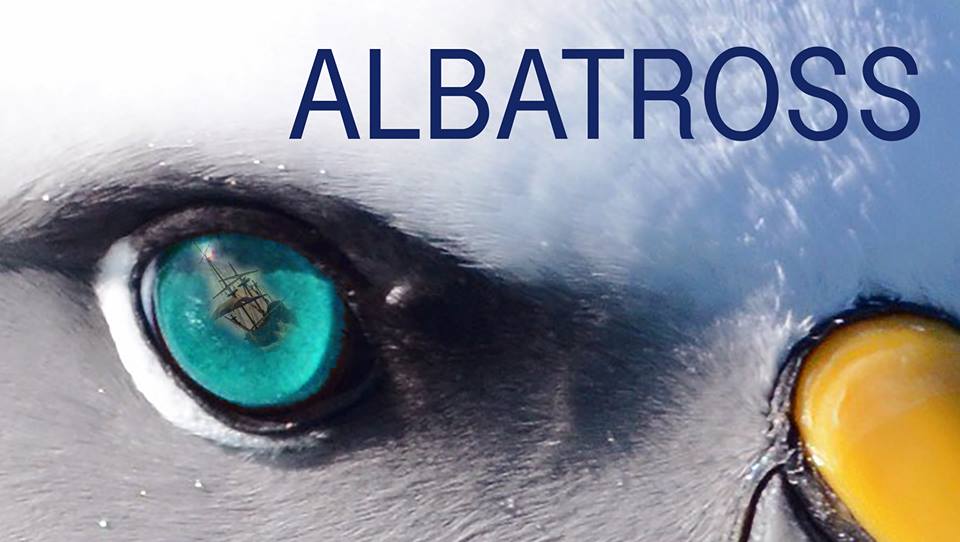
Presented by the Poets’ Theatre in collaboration with Ocean Conservancy
Directed by Rick Lombardo
Written by Matthew Spangler & Benjamin Evett
Based on “The Rime of the Ancient Mariner” by Samuel Taylor Coleridge
The poem can be read here.
Feb. 13 – March 1, 2015
The Jackie Liebergott Black Box Theatre
Emerson/Paramount Center
Boston, MA 02111
Poets’ Theatre on Facebook
Ocean Conservancy on Facebook
Trigger Warnings: graphic violence, harsh language
Review by Kitty Drexel
(Boston, MA) Disney’s Captain Jack Sparrow is a poster boy for pirates. He’s grimy, clever thief with a heart of tarnished gold. Jack likely smells rank but has an unmistakable charisma that drives audiences wild. Some want to be him; some want to f^ck him, etc. It’s no wonder that this franchise made so much money.
Sparrow is a lie. He is the Hollywood equivalent of a romantic adventure on the high seas with creatures great and majestic during a time that never was. Pirates are not charming; they are brutal criminals capable of unthinkable acts. Historically, pirates sailing the Atlantic sacked and ravaged rival merchant ships. Cruelty was de rigueur.
Privateers, according to the Poets’ Theatre’s programme, were much the same as pirates except they had a Letter of Marque, a royal document sanctioning their looting and attacking. They were pirates with a permission slip from their Daddy, the King. It is on one of these ships that the Ancient Mariner meets his fate.
Albatross, the one-man play presented by the Poets’ Theatre, retells the poem “The Rime of the Ancient Mariner.” In the play, the Mariner (Benjamin Evett) relays his epic story to the audience. In 1720’s Bristol, England, he was drugged and involuntarily conscripted to a privateer’s ship. In a fit of boredom, the Mariner makes shoots an albatross while the ship drifts out of Antarctic waters. To sum up a long story, the crew dies except for our anti-hero. He must wander the earth forever telling his tale so as to repent for his wicked deed.
The performance opened on a ghostlight with the carcass of a set as its dressing. The design by Cristina Todesco evokes loneliness and destitution. The Mariner is a man on the edge of his humanity. His environment is as sparse as his social grace.
Updates to the script from the poem include current slang, technological references unique to the 21st century, and more modern historical references. Matthew Spangler & Benjamin Evett’s script does a good job of quickly reminding the audience of the Mariner’s origins while informing us of his present worldliness.
Evett as our brusque, craggy Mariner is intense and deeply effective. He has the fervor of a half-crazed, Central Square hobo on an unfortunate bender. If we weren’t his audience, if we hadn’t chosen to spend our evening with him, we’d be avoiding eye contact and calling security. We watch Evett’s Mariner because he’s telling a whopper of a story, with all the right twists and turns to draw our attention. “Rime” has a predictable, too well-known ending for Albatross to resolve happily. Evett’s magnetism keeps us listening anyway.
Viewers must be wary: a lot of violence is depicted in Albatross. It is a nightmare poem, not some fluffy piece for romantics. The Mariner, for obvious reasons, curses like a sailor and has a wide vocabulary which he uses to entertain. On the high seas of the 1700’s, there were few rules and even fewer people to enforce them. The descriptions of starvation, boredom, death and life are grisly and gruesome. Children should not attend without an adult. Adults should consider their delicate ears before attending. If you enjoy stagings of Finnegan’s Wake, you’ll likely enjoy Albatross.
Lastly: Humans are cruel because they can be. Sometimes there is no other answer. The acts depicted in this production are fiction but humanity’s potential for cruelty is not. It’s not theatre’s job to be pretty but to tell truths. We are lucky that art can be pretty with such frequently. Albatross is not pretty, for this reason it is necessary.
More information on “The Rime of the Ancient Mariner”:
For the silent film (1925), see The Ancient Mariner (film).
For the talkie film (1975), see Rime of the Ancient Mariner.
For the song by Iron Maiden on their album (1984), see Powerslave.
